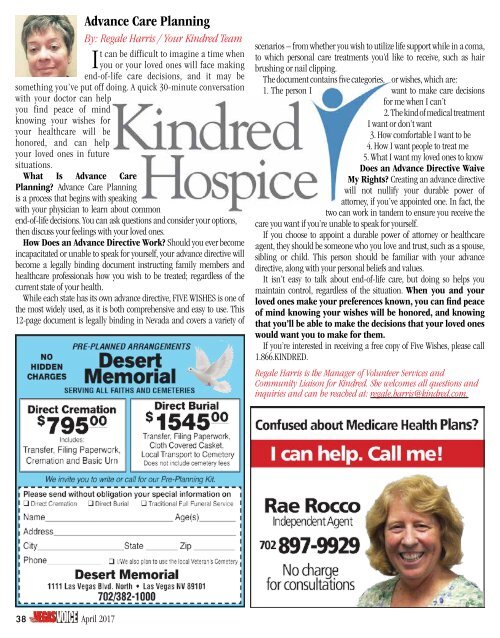You also want an ePaper? Increase the reach of your titles
YUMPU automatically turns print PDFs into web optimized ePapers that Google loves.
Advance Care Planning<br />
By: Regale Harris / Your Kindred Team<br />
It can be difficult to imagine a time when<br />
you or your loved ones will face making<br />
end-of-life care decisions, and it may be<br />
something you’ve put off doing. A quick 30-minute conversation<br />
with your doctor can help<br />
you find peace of mind<br />
knowing your wishes for<br />
your healthcare will be<br />
honored, and can help<br />
your loved ones in future<br />
situations.<br />
What Is Advance Care<br />
Planning? Advance Care Planning<br />
is a process that begins with speaking<br />
with your physician to learn about common<br />
end-of-life decisions. You can ask questions and consider your options,<br />
then discuss your feelings with your loved ones.<br />
How Does an Advance Directive Work? Should you ever become<br />
incapacitated or unable to speak for yourself, your advance directive will<br />
become a legally binding document instructing family members and<br />
healthcare professionals how you wish to be treated; regardless of the<br />
current state of your health.<br />
While each state has its own advance directive, FIVE WISHES is one of<br />
the most widely used, as it is both comprehensive and easy to use. This<br />
12-page document is legally binding in Nevada and covers a variety of<br />
scenarios – from whether you wish to utilize life support while in a coma,<br />
to which personal care treatments you’d like to receive, such as hair<br />
brushing or nail clipping.<br />
The document contains five categories, or wishes, which are:<br />
1. The person I want to make care decisions<br />
for me when I can’t<br />
2. The kind of medical treatment<br />
I want or don’t want<br />
3. How comfortable I want to be<br />
4. How I want people to treat me<br />
5. What I want my loved ones to know<br />
Does an Advance Directive Waive<br />
My Rights? Creating an advance directive<br />
will not nullify your durable power of<br />
attorney, if you’ve appointed one. In fact, the<br />
two can work in tandem to ensure you receive the<br />
care you want if you’re unable to speak for yourself.<br />
If you choose to appoint a durable power of attorney or healthcare<br />
agent, they should be someone who you love and trust, such as a spouse,<br />
sibling or child. This person should be familiar with your advance<br />
directive, along with your personal beliefs and values.<br />
It isn’t easy to talk about end-of-life care, but doing so helps you<br />
maintain control, regardless of the situation. When you and your<br />
loved ones make your preferences known, you can find peace<br />
of mind knowing your wishes will be honored, and knowing<br />
that you’ll be able to make the decisions that your loved ones<br />
would want you to make for them.<br />
If you’re interested in receiving a free copy of Five Wishes, please call<br />
1.866.KINDRED.<br />
Regale Harris is the Manager of Volunteer Services and<br />
Community Liaison for Kindred. She welcomes all questions and<br />
inquiries and can be reached at: regale.harris@kindred.com.<br />
38<br />
April 20<strong>17</strong>

















